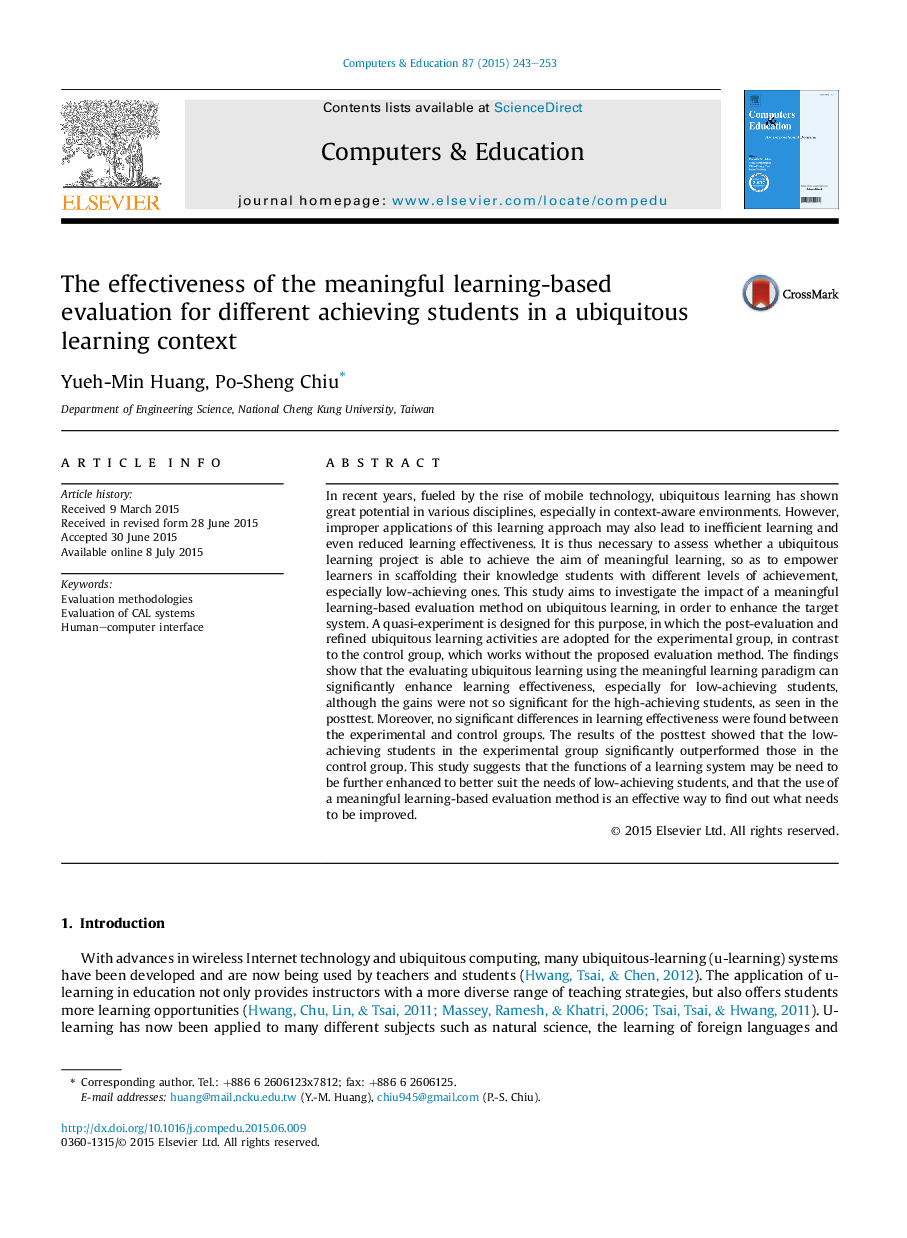| کد مقاله | کد نشریه | سال انتشار | مقاله انگلیسی | نسخه تمام متن |
|---|---|---|---|---|
| 6835044 | 618169 | 2015 | 11 صفحه PDF | دانلود رایگان |
عنوان انگلیسی مقاله ISI
The effectiveness of the meaningful learning-based evaluation for different achieving students in a ubiquitous learning context
ترجمه فارسی عنوان
اثربخشی ارزیابی مبتنی بر یادگیری معنی دار برای دانش آموزان مختلف در زمینه یادگیری در همه جا
دانلود مقاله + سفارش ترجمه
دانلود مقاله ISI انگلیسی
رایگان برای ایرانیان
کلمات کلیدی
ترجمه چکیده
در سال های اخیر، با افزایش فن آوری تلفن همراه، یادگیری فراگیر در بسیاری از رشته ها، به ویژه در محیط های متداول محیط، نشان داده است. با این حال، استفاده نادرست از این روش یادگیری ممکن است منجر به ناکارآمدی یادگیری و حتی کاهش اثربخشی یادگیری شود. بنابراین لازم است که ارزیابی نماییم که آیا یک پروژه یادگیری همه جا حاضر قادر به دستیابی به هدف یادگیری معنی دار است تا بتواند دانش آموزان را در تسخیر دانش آموزان دانش خود با سطوح مختلف دستاورد، به ویژه در دستیابی به اهداف کم، به آن ها بسپارد. هدف از این مطالعه بررسی تأثیر یک روش ارزیابی مبتنی بر یادگیری مبتنی بر یادگیری فراگیر برای بهبود سیستم هدف است. برای این منظور یک آزمایش شبه آزمایشی طراحی شده است که در آن گروههای آزمایشی پس از ارزیابی و اصلاح فعالیت های یادگیری فراگیر در مقایسه با گروه کنترل که بدون روش ارزیابی پیشنهادی کار می کنند، مورد استفاده قرار می گیرند. یافته ها نشان می دهند که یادگیری در همه جا سنجی ها با استفاده از پارادایم یادگیری معنی دار می تواند به طور قابل توجهی افزایش یادگیری را افزایش دهد، به ویژه برای دانش آموزان کم توان، گرچه دستاوردها برای دانش آموزان با اهداف بالا اهمیت زیادی نداشتند. علاوه بر این، تفاوت معنی داری در اثربخشی یادگیری بین گروه های تجربی و کنترل مشاهده نشد. نتایج پس آزمون نشان داد که دانشجویان کم تجربه در گروه آزمایشی به طور معناداری بیشتر از گروه کنترل بودند. این مطالعه نشان می دهد که عملکرد سیستم یادگیری ممکن است نیاز بیشتری به منظور بهتر برآورده شدن نیازهای دانش آموزان کم دست یافته و استفاده از یک روش سنجش یادگیری مبتنی بر یادگیری، راه موثر برای پیدا کردن آنچه نیاز است پیشرفت کن.
موضوعات مرتبط
علوم انسانی و اجتماعی
علوم اجتماعی
آموزش
چکیده انگلیسی
In recent years, fueled by the rise of mobile technology, ubiquitous learning has shown great potential in various disciplines, especially in context-aware environments. However, improper applications of this learning approach may also lead to inefficient learning and even reduced learning effectiveness. It is thus necessary to assess whether a ubiquitous learning project is able to achieve the aim of meaningful learning, so as to empower learners in scaffolding their knowledge students with different levels of achievement, especially low-achieving ones. This study aims to investigate the impact of a meaningful learning-based evaluation method on ubiquitous learning, in order to enhance the target system. A quasi-experiment is designed for this purpose, in which the post-evaluation and refined ubiquitous learning activities are adopted for the experimental group, in contrast to the control group, which works without the proposed evaluation method. The findings show that the evaluating ubiquitous learning using the meaningful learning paradigm can significantly enhance learning effectiveness, especially for low-achieving students, although the gains were not so significant for the high-achieving students, as seen in the posttest. Moreover, no significant differences in learning effectiveness were found between the experimental and control groups. The results of the posttest showed that the low-achieving students in the experimental group significantly outperformed those in the control group. This study suggests that the functions of a learning system may be need to be further enhanced to better suit the needs of low-achieving students, and that the use of a meaningful learning-based evaluation method is an effective way to find out what needs to be improved.
ناشر
Database: Elsevier - ScienceDirect (ساینس دایرکت)
Journal: Computers & Education - Volume 87, September 2015, Pages 243-253
Journal: Computers & Education - Volume 87, September 2015, Pages 243-253
نویسندگان
Yueh-Min Huang, Po-Sheng Chiu,
